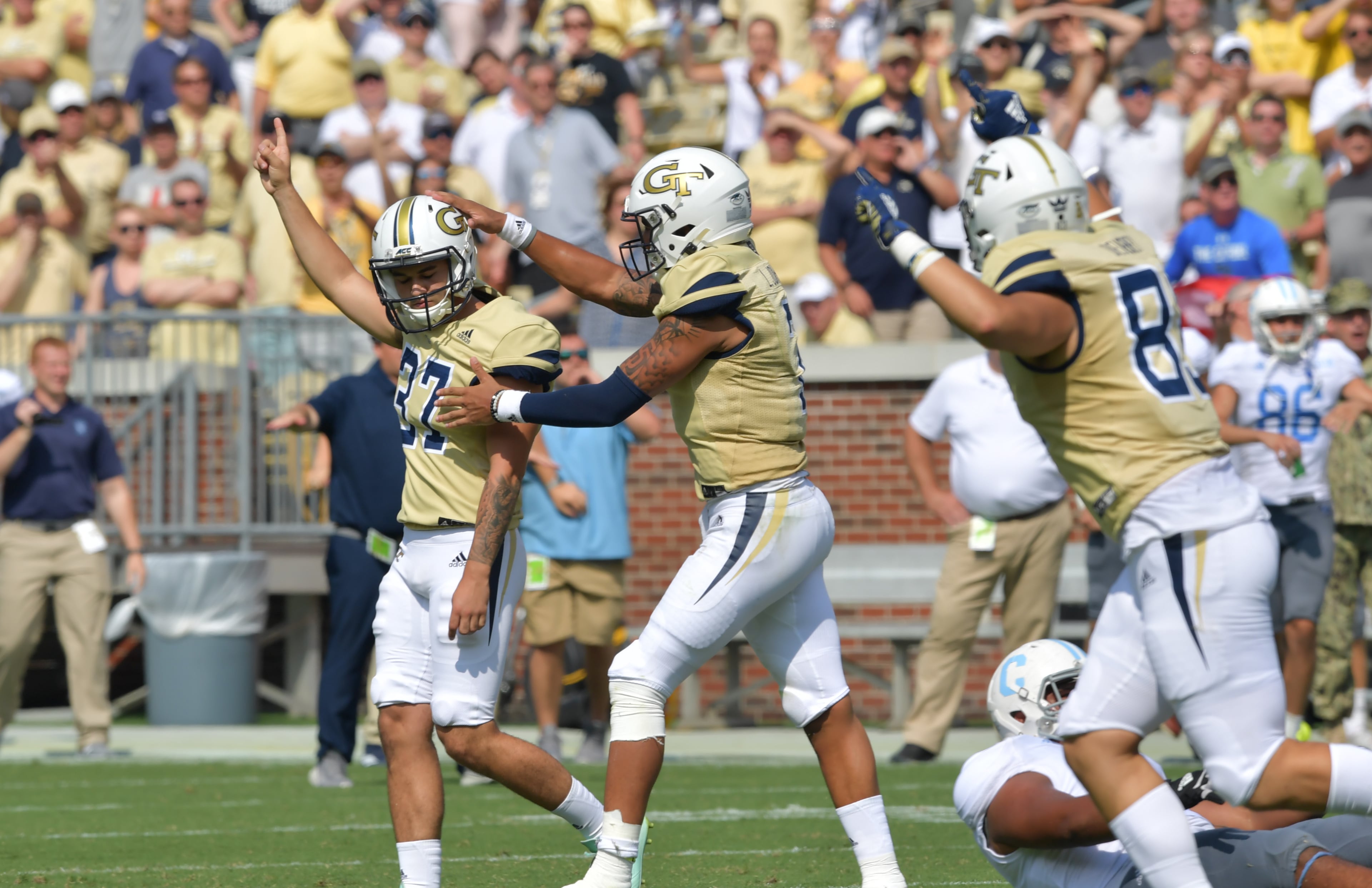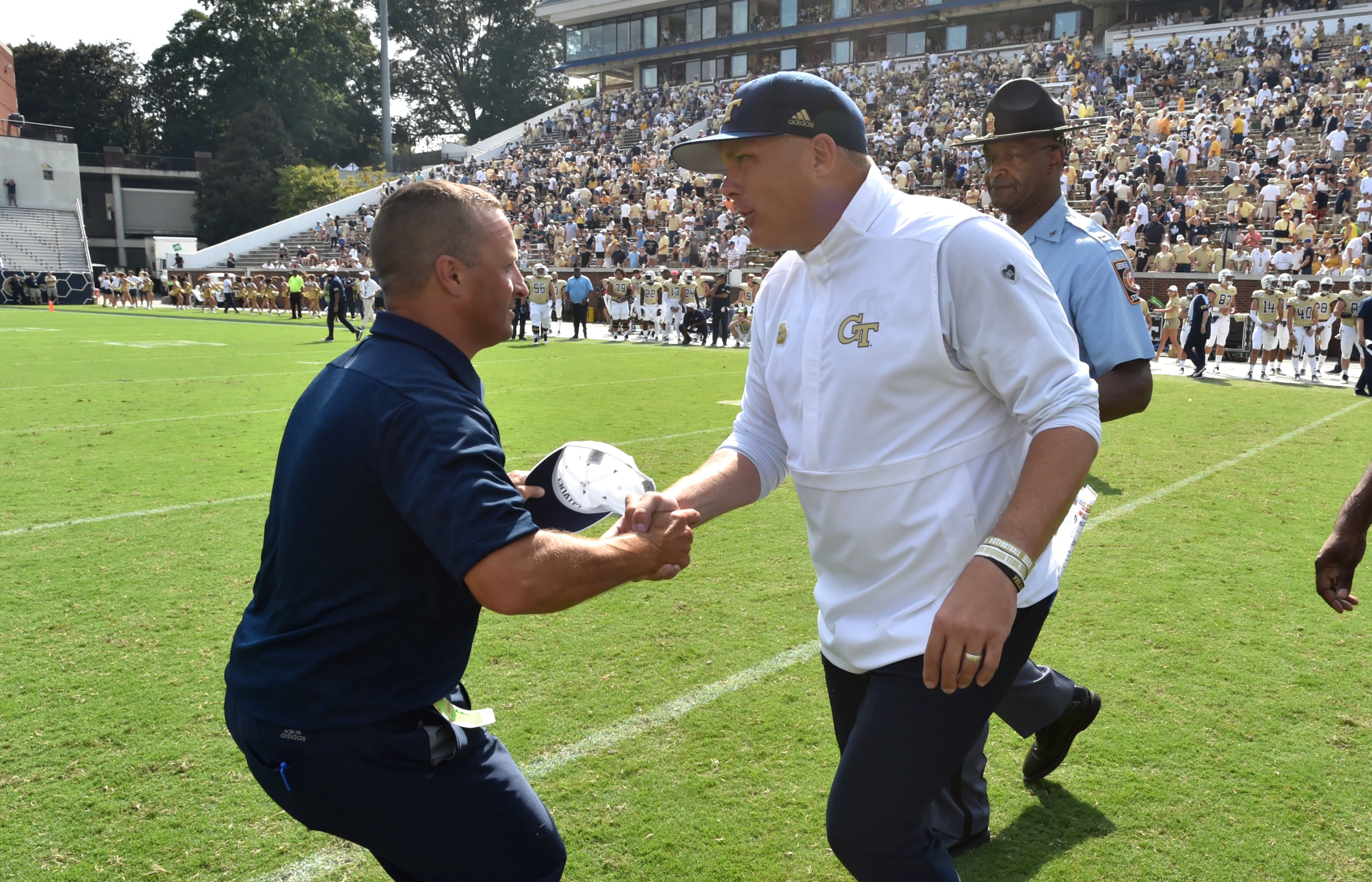Analysis: Collins says ‘blame me’ for stunning loss to The Citadel


























After losing 27-24 in overtime to The Citadel, Georgia Tech coach Geoff Collins said he told his team the reasons why it lost, but added that those explanations will remain private.
“But externally, to the public, it’s all on me,” Collins said. “Blame me. I’m good. I can handle it because I understand the inner workings of what’s happening in that locker room.”
As Tech recovers from humbling defeat and heads into its first open date of the season, here are five takeaways from the loss.
Expect quarterback rotation to continue: Collins made it clear after the game that he is quite comfortable with his practice of rotating quarterbacks. For the third game, Collins and offensive coordinator Dave Patenaude used both throughout the game (James Graham was out with a foot injury), sometimes switching them out in the same series.
“The people that can help us play really well on a college football Saturday or Friday or Thursday or whenever we play, if they’ve earned the right to contribute to this team, they’re going to play,” he said. “And we will continue to do that.”
Johnson was more effective throwing the ball than he was against South Florida (5-for-10 for 91 yards and a touchdown) while Oliver was dangerous running the ball (11 carries for 92 yards).
Inexplicably drubbed on defense: Beyond Tech's defenders having seen the triple-option offense run at a high level in practice during the tenure of former coach Paul Johnson, another perplexing matter in watching the Bulldogs grind out 350 yards of offense was that Tech coaches had experience against it, too. In their two years at Temple, Collins and defensive coordinator Andrew Thacker faced Navy twice and Army once, going 2-1 while allowing a comparable average of 345 yards of offense.
Tech used a special alignment with the intent of keeping The Citadel getting the ball out on the perimeter, “and for whatever reason, it was still hitting us,” Collins said. “There were some times we got it corrected.”
More than that, The Citadel had averaged 291 yards of offense in losing its first two games against FCS competition. Further, the Bulldogs had to rely on backup quarterback Brian Murdaugh for the final quarter and overtime after starter Brandon Rainey left the game with an injury.
Woes on the offensive line: The offensive line that was already thin was compromised further by the leg injury to left tackle Jahaziel Lee near the end of the third quarter. Walk-on Hamp Gibbs was sent into the game at right guard, Zach Quinney moved from right tackle to left tackle and Jared Southers bumped out from right guard to right tackle, meaning that only left guard Jack DeFoor and center Kenny Cooper were in the same positions in which they had started the game.
Gibbs, a sophomore, was playing his first college snaps, the second week in a row that injuries required that initiation for a walk-on lineman, following center William Lay’s debut against South Florida.
It appears that Lee will be out for a significant stretch, and it’s a cruel blow for him and the team, as coaches had planned to use the senior on both offensive and defensive lines to address depth at both groups. Beyond that, linemen Mikey Minihan, Charlie Clark and Scott Morgan watched from the sidelines wearing, respectively, a walking boot, sling and bandaged knee.
“The guys are fighting,” Collins said. “It’s a bunch of guys that we’re piecemealing together.”
Tough road ahead: There was no denying the visceral reaction to losing to an FCS team, particularly one picked by Southern Conference coaches to finish seventh in the nine-team league. It was only the second loss in school history to a non-FBS team following the 1983 loss to Furman.
That said, embarrassing losses are part of the game’s landscape. With Tech’s loss, at least one power-conference team has lost to an FCS team for the past 11 years, many of which continued on to bowl games. In 2008, the Jackets very nearly lost to FCS Gardner-Webb in coach Paul Johnson’s first season. Collins himself oversaw a loss at Temple to Villanova last season after nearly losing to the same Wildcats in 2017.
But it does speak to deficiencies in depth and development that the Jackets face this season. ESPN’s Football Power Index projects that Tech holds no better than a 29 percent chance to win any of its remaining nine games. Collins acknowledged the thin offensive line and the lack of experience on defense.
“It’s a work in progress and it’s going to be really good eventually,” Collins said. “We’ve just got to keep fighting the fight and keeping a great attitude while we do it.”
How do Jackets respond?: Since his hire, Collins has touted a new culture, one defined in part by "extreme, exaggerated passion" and a lack of entitlement. This past week, both were evidently lacking. Both linebacker David Curry and safety Tariq Carpenter admirably owned the defeat, saying that players had overlooked their FCS opponent.
“I feel like, throughout the whole week of practice, (it was) like, oh, we’re going to win,” Carpenter said, ‘and they just caught us sleeping.”
Curry cited a lack of attention to detail in practice that he felt showed up in the game.
“But we’ve just got to show up to play every single game, no matter who you’re playing,” he said. “You can’t just roll the ball out and think you’re going to win.”
The challenge is now upon Collins and his team to use the next two weeks far better than they did the past one. They will go on the road to face an opponent – Temple, Collins’ former employer – that will likely be quite eager to mete out more misery to the Jackets.
“One thing’s for sure is we’re going to stick together as a team,” Curry said. “Each one of us loves each other and we’ve got a lot of work to do.”



